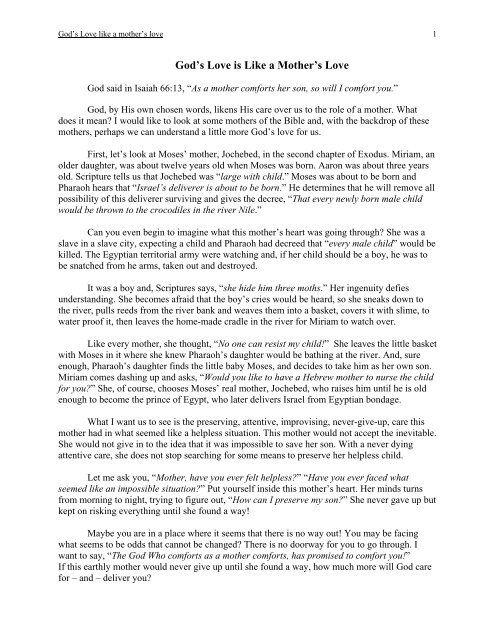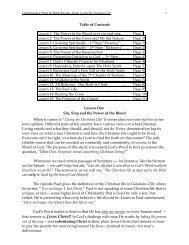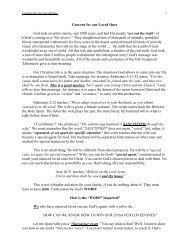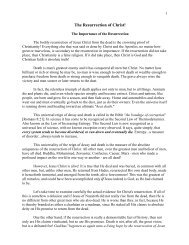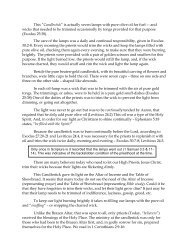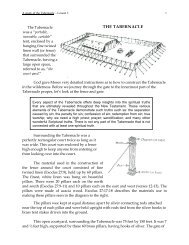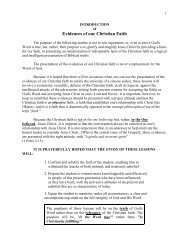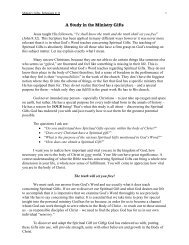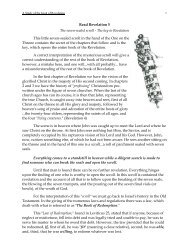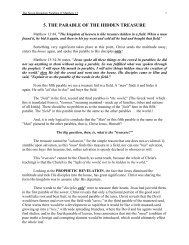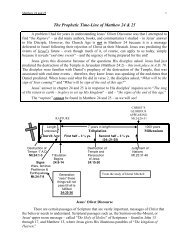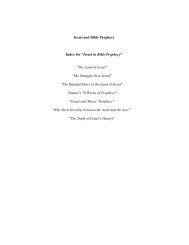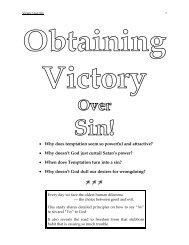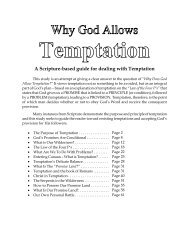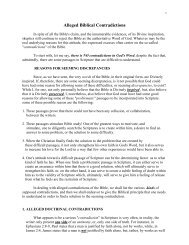God's Love is Like a Mother's Love - NetBibleStudy.com
God's Love is Like a Mother's Love - NetBibleStudy.com
God's Love is Like a Mother's Love - NetBibleStudy.com
You also want an ePaper? Increase the reach of your titles
YUMPU automatically turns print PDFs into web optimized ePapers that Google loves.
God’s <strong>Love</strong> like a mother’s love 1<br />
God’s <strong>Love</strong> <strong>is</strong> <strong>Like</strong> a Mother’s <strong>Love</strong><br />
God said in Isaiah 66:13, “As a mother <strong>com</strong>forts her son, so will I <strong>com</strong>fort you.”<br />
God, by H<strong>is</strong> own chosen words, likens H<strong>is</strong> care over us to the role of a mother. What<br />
does it mean I would like to look at some mothers of the Bible and, with the backdrop of these<br />
mothers, perhaps we can understand a little more God’s love for us.<br />
First, let’s look at Moses’ mother, Jochebed, in the second chapter of Exodus. Miriam, an<br />
older daughter, was about twelve years old when Moses was born. Aaron was about three years<br />
old. Scripture tells us that Jochebed was “large with child.” Moses was about to be born and<br />
Pharaoh hears that “Israel’s deliverer <strong>is</strong> about to be born.” He determines that he will remove all<br />
possibility of th<strong>is</strong> deliverer surviving and gives the decree, “That every newly born male child<br />
would be thrown to the crocodiles in the river Nile.”<br />
Can you even begin to imagine what th<strong>is</strong> mother’s heart was going through She was a<br />
slave in a slave city, expecting a child and Pharaoh had decreed that “every male child” would be<br />
killed. The Egyptian territorial army were watching and, if her child should be a boy, he was to<br />
be snatched from he arms, taken out and destroyed.<br />
It was a boy and, Scriptures says, “she hide him three moths.” Her ingenuity defies<br />
understanding. She be<strong>com</strong>es afraid that the boy’s cries would be heard, so she sneaks down to<br />
the river, pulls reeds from the river bank and weaves them into a basket, covers it with slime, to<br />
water proof it, then leaves the home-made cradle in the river for Miriam to watch over.<br />
<strong>Like</strong> every mother, she thought, “No one can res<strong>is</strong>t my child!” She leaves the little basket<br />
with Moses in it where she knew Pharaoh’s daughter would be bathing at the river. And, sure<br />
enough, Pharaoh’s daughter finds the little baby Moses, and decides to take him as her own son.<br />
Miriam <strong>com</strong>es dashing up and asks, “Would you like to have a Hebrew mother to nurse the child<br />
for you” She, of course, chooses Moses’ real mother, Jochebed, who ra<strong>is</strong>es him until he <strong>is</strong> old<br />
enough to be<strong>com</strong>e the prince of Egypt, who later delivers Israel from Egyptian bondage.<br />
What I want us to see <strong>is</strong> the preserving, attentive, improv<strong>is</strong>ing, never-give-up, care th<strong>is</strong><br />
mother had in what seemed like a helpless situation. Th<strong>is</strong> mother would not accept the inevitable.<br />
She would not give in to the idea that it was impossible to save her son. With a never dying<br />
attentive care, she does not stop searching for some means to preserve her helpless child.<br />
Let me ask you, “Mother, have you ever felt helpless” “Have you ever faced what<br />
seemed like an impossible situation” Put yourself inside th<strong>is</strong> mother’s heart. Her minds turns<br />
from morning to night, trying to figure out, “How can I preserve my son” She never gave up but<br />
kept on r<strong>is</strong>king everything until she found a way!<br />
Maybe you are in a place where it seems that there <strong>is</strong> no way out! You may be facing<br />
what seems to be odds that cannot be changed There <strong>is</strong> no doorway for you to go through. I<br />
want to say, “The God Who <strong>com</strong>forts as a mother <strong>com</strong>forts, has prom<strong>is</strong>ed to <strong>com</strong>fort you!”<br />
If th<strong>is</strong> earthly mother would never give up until she found a way, how much more will God care<br />
for – and – deliver you
God’s <strong>Love</strong> like a mother’s love 2<br />
2.<br />
The second mother I want us to look at <strong>is</strong> Mary, the mother of Jesus. John 19:25 says,<br />
“There stood my H<strong>is</strong> cross H<strong>is</strong> mother.”<br />
Here <strong>is</strong> a scene that strong men have fled from, however, Mary, who had seen her Son<br />
beaten and dragged through the street of Jerusalem, stood and watched the nails driven into H<strong>is</strong><br />
hands and feet. She had seen H<strong>is</strong> cross ra<strong>is</strong>ed in the air. As Jesus hung there, I’m sure you<br />
mothers can feel a little of what Mary must of felt. She did not faint, nor faultier. She stood<br />
there!<br />
She did not understand what was happening. When Jesus was twelve years old, Mary and<br />
Joseph had taken Him to the Temple. As they were hurrying around and heading for home, they<br />
found that Jesus was not with them. They go back to the Temple and find Him teaching the<br />
Scribes. Mary explains, “Your father and I have been looking for you.” Jesus answers, “Don’t<br />
you know that I must be about My Father’s business” Jesus’ statement seems to have cut across<br />
her claims. She didn’t understand.<br />
Jesus leaves home when he <strong>is</strong> thirty years old. Sometime during th<strong>is</strong> interval, Joseph dies,<br />
and Jesus, no doubt, supported the family. After min<strong>is</strong>tering in other places, Jesus <strong>com</strong>es back<br />
home, and the crowd says, “Isn’t th<strong>is</strong> the carpenter’s son” They drive Him out of the city to a<br />
cliff, to cast Him off its steep embankment.<br />
H<strong>is</strong> mother <strong>is</strong> concerned for Him and gathers H<strong>is</strong> brothers to <strong>com</strong>e to Him. Jesus <strong>is</strong> told,<br />
“Your mother and brothers seek You!” Jesus answers, “Who <strong>is</strong> My mother” She must have been<br />
shocked by Jesus’ question. It must have cut into Mary’s heart as she feels rejection.<br />
Can you get inside th<strong>is</strong> mother’s heart She sees her son rejected and desp<strong>is</strong>ed. In the<br />
end, she sees that even H<strong>is</strong> closest followers deny Him. She sees Him dying in shame in the most<br />
despicable kind of death. But nothing can drive her away. “She stood by H<strong>is</strong> cross!”<br />
Mothers, let me ask you, “Have you ever felt rejected Have you ever feel that no one<br />
understands” Th<strong>is</strong> mother did not understand, despite the Simeon’s prophecy at Jesus’<br />
dedication, “A sword will pierce through your soul!” She didn’t understand, but she stood by<br />
Him.<br />
Oh, the enduring, steadfast, unremitting love of th<strong>is</strong> mother!<br />
Mothers – and anyone else here that needs th<strong>is</strong> reality – “God does understand your<br />
problem and He will <strong>com</strong>fort as a mother <strong>com</strong>forts.”<br />
3.<br />
Let’s look at a third mother. Her name <strong>is</strong> “Rizpah.” She can be found in the 21 st chapter<br />
of 2 Samuel. She <strong>is</strong> the mother of two of Saul’s sons. However, she was never Saul’s wife, but a<br />
concubine. Saul – (that <strong>is</strong>, “Saul,” Israel’s first king in the Old Testament) – Saul had such a<br />
great beginning, but he forgot many things that God had said to him and, in the end, confessed,<br />
“I have played the part of a fool!” He wouldn’t do things God’s way. He failed to remember the<br />
vows he made to God.
God’s <strong>Love</strong> like a mother’s love 3<br />
On th<strong>is</strong> occasion, Saul had vowed, “The people of Israel would never kill the Gibeonites,”<br />
and he sealed h<strong>is</strong> prom<strong>is</strong>e in God’s name. But, he forgot all about h<strong>is</strong> vow and set out to<br />
exterminate the Gibeonites. He loses the battle and ends up <strong>com</strong>mitting suicide.<br />
David be<strong>com</strong>es king over Israel and, because Saul had forgotten h<strong>is</strong> vow, and failed to<br />
honor it, David asks what he could do to make atonement. We can never understand it, but, in the<br />
brutal frame of reference of that day, they ask for the seven sons of Saul – (two of which were<br />
Rizpah’s) – to be hung on the hill of Gibeah, where the fierce battle had been fought. David met<br />
their request. The Bible tells us in the 21 st chapter of 2 Samuel that Saul’s sons were “hung in the<br />
month of barley harvest” (or, the month of April).<br />
R<strong>is</strong>pah goes to th<strong>is</strong> hill where her sons were hanging and Scripture tell us that she<br />
“spreads out sackcloth” – a sign of mourning – “from barley harvest until the <strong>com</strong>ing rains.”<br />
The Bible tells us that she stayed on that hill, fighting off the birds by day and the animals at<br />
night!<br />
Think of that mother, alone on that hillside, fighting the birds in the heat of the sun and<br />
the wild beasts at night. April, May, June, July, August, September, October – seven long<br />
months, she was there protecting the bodies of her sons. In October King David hears about th<strong>is</strong><br />
mother, how that she had stayed there until she died. And, because of her actions, David has the<br />
bones of Saul’s seven sons taken down and given an honorable burial.<br />
At the r<strong>is</strong>k of sounding a little gruesome, I ask you to picture th<strong>is</strong> mother, Rizpah. Her<br />
sons had ceased to be lovely. The objects of her love and be<strong>com</strong>e things of horror. Decay had set<br />
in, blackened by the sun. The stench of de<strong>com</strong>position was there. Her sons had be<strong>com</strong>e unlovely,<br />
but th<strong>is</strong> did not dim her love! They were counted a curse, unworthy of the burial of even dogs,<br />
yet, Rizpah, would not cast them out of her heart. They were objects that only a mother could<br />
love. Others shunned them but she would still cling to them and would not let them go. Others<br />
may treat them with deep d<strong>is</strong>grace, but she still had a deep <strong>com</strong>passion for them.<br />
God said, “As a mother <strong>com</strong>forts, I prom<strong>is</strong>e to <strong>com</strong>fort you!”<br />
1. Jochebed – reveals how a mother’s love will never give up improv<strong>is</strong>ing a way<br />
to deliver, so God will find a way to deliver us.<br />
2. Mary – pictures a mother whose love seemed to be rejected,<br />
yet remained true when all else turned away.<br />
3. Rizeph – shows a mother who loves the unlovely and despicable.<br />
God prom<strong>is</strong>ed to be like a mother to us. We do grow weary in th<strong>is</strong> life. In a day when<br />
there <strong>is</strong> too little love, we need to ask God to give us a higher sense of the privilege of being an<br />
expression of H<strong>is</strong> love. To those who feel helpless, rejected and desp<strong>is</strong>ed, we need to pray for<br />
new hope, a new realization of what kind of God we have. We need to thank God for revealing<br />
h<strong>is</strong> nature through the love of mothers and give us eyes to see and hearts to respond. We need to<br />
claim God’s prom<strong>is</strong>e to be a “Mother” to us.


